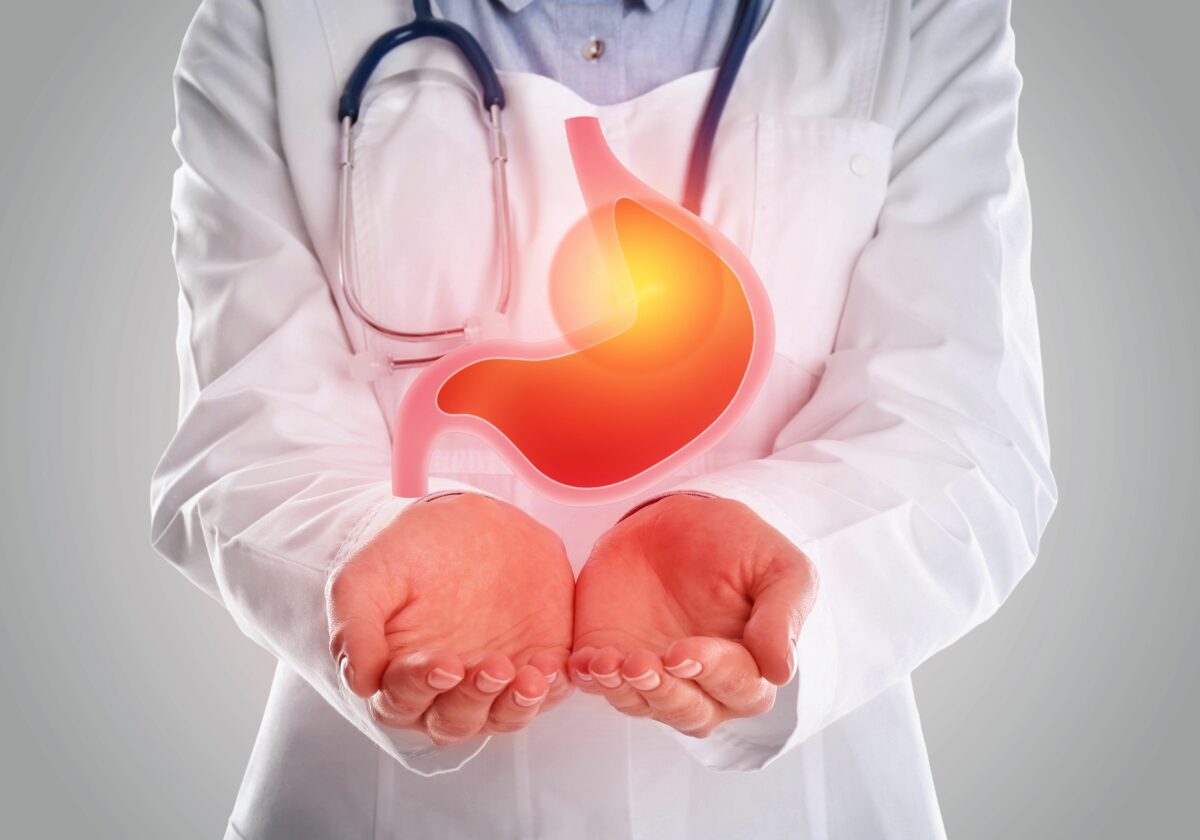Have you ever had a bit of tummy ache after eating something that didn’t quite agree with you? Maybe you’ve experienced bloating or constipation from time to time. These are all common symptoms of gastrointestinal (GI) disorders, affecting millions worldwide. Gastrointestinal disorders, such as irritable bowel syndrome (IBS), can be complex to diagnose and manage. From abdominal pain to diarrhea to gas and bloating, living with a gastrointestinal disorder can affect your day-to-day life in profound ways.
While having a GI issue is difficult, understanding the basics of digestive health and identifying symptoms commonly associated with these disorders helps ensure you take the best care of yourself. Let’s look at the common gastrointestinal disorders, explore their symptoms, and learn tips to prevent them from occurring.
Common Types of Gastrointestinal Disorders
When it comes to digestive troubles, there are a variety of conditions and disorders that can cause pain, discomfort, and a general feeling of unease. Some of the most common types of gastrointestinal disorders include irritable bowel syndrome (IBS), acid reflux disease, Crohn’s disease, and ulcerative colitis. These conditions can vary in severity and symptoms and can often be managed with lifestyle changes, medication, or other treatments.
Although these types of disorders can be frustrating and challenging to deal with, it’s important to stay informed and work with a healthcare professional to find the right course of action for your situation. With the right approach, finding relief and getting your digestive system back on track is possible.

Gastrointestinal Symptoms to Watch For
One of the key components of managing a gastrointestinal disorder is recognizing the signs and symptoms. While every individual’s experience can differ, some common issues to watch out for may indicate an underlying digestive problem. These include:
- Abdominal discomfort and cramping
- Diarrhea or constipation
- Nausea and vomiting
- Excessive gas and bloating
- Difficulty in swallowing
- Acid reflux or heartburn
- Persistent heartburn
- Diarrhea or loose stools
- Bowel incontinence
- Presence of blood in stool
- Changes in bowel habits
- Unexplained weight gain or loss
If you experience any of these symptoms regularly, it’s important to consult with a healthcare professional for a proper diagnosis and treatment plan. Also Read: Toilet Scrolling: The negative health impact of using your phone while on the toilet.
Diagnostic Tests Used to Identify GI Disorders
The digestive tract is a complex system responsible for breaking down food into nutrients that our bodies can absorb. However, it’s not uncommon for people to experience gastrointestinal (GI) disorders that can cause discomfort and pain. Fortunately, there are several diagnostic tests available to help identify these disorders. One standard diagnostic tool is a stool sample analysis, which can reveal the presence of certain bacteria or parasites that could be causing gastrointestinal distress.
Another useful test is a colonoscopy, which allows doctors to see inside the colon and identify abnormalities like polyps or tumors. Blood tests can also help identify conditions like celiac disease or inflammatory bowel disease. With these and other diagnostic tools available, healthcare providers have multiple options for narrowing down the cause of a patient’s GI issues, allowing for more targeted and effective treatment plans.

Treatment Options for GI Disorders
When it comes to gastrointestinal disorders, finding the proper treatment can be a daunting task. Numerous options are available, and it can be hard to know where to start. However, with the help of a medical professional, a patient can create a personalized treatment plan that targets their specific symptoms and needs. Some treatments for GI disorders include medication, dietary changes, surgery, and lifestyle modifications.
Each option can potentially improve a patient’s quality of life and alleviate their symptoms. Working with a healthcare provider, individuals can find the best treatment plan for them and their unique situation. With the right treatment and support, managing GI disorders can become manageable, allowing you to live your life to the fullest. Also Read: How Sleep Duration Affects Your Mental and Physical Health.
Lifestyle Changes to Help Manage GI Disorders
Living with gastrointestinal (GI) disorders can often feel like an uphill battle, but making lifestyle changes can make all the difference in managing symptoms. Here are some simple tweaks that can have a significant impact on managing your GI disorder and improving your overall well-being:
- Add more fruits and vegetables to your diet: Incorporating a variety of colorful fruits and vegetables provides essential nutrients and fiber to support digestive health.
- Hydrate, hydrate, hydrate: Staying hydrated helps maintain proper digestion and prevents constipation.
- Practice stress-reducing activities: Engage in yoga or meditation to reduce stress, which can positively affect your gut health. Taking a walk can also help to clear your mind and improve digestion.
- Find a balance between exercise and rest: Regular exercise promotes healthy digestion, while adequate rest allows your body to recover and repair. Creating a balance between the two can help manage your GI disorder.
- Avoid trigger foods: Keep a food diary to identify foods that may trigger symptoms and try to limit or eliminate them from your diet. Common trigger foods include caffeine, alcohol, spicy foods, and processed or high-fat foods.
- Quit smoking: Smoking can worsen symptoms of GI disorders such as GERD and Crohn’s disease. Quitting smoking not only benefits your overall health but can also improve your GI symptoms.
- Eat smaller, more frequent meals: Eating large meals can put stress on the digestive system, so opting for smaller, more frequent healthy meals can help ease symptoms.
- Limit alcohol and caffeine intake: Excessive consumption of alcohol and caffeine can irritate the digestive system. Moderation is key.
By prioritizing self-care and making these lifestyle changes, you can take important steps toward managing your GI disorder and improving your well-being.
Dietary Adjustments to Alleviate Symptoms
Living with chronic health conditions can be challenging, and often, symptoms can be alleviated through simple dietary adjustments. Whether it be inflammation, digestive issues, or fatigue, the food we eat plays a significant role in how our bodies function. By being more mindful of our consumption, we can better manage our symptoms and improve our overall health. For example, incorporating more anti-inflammatory foods such as salmon, leafy greens, and turmeric into your diet can help reduce joint pain and swelling.
Similarly, avoiding certain trigger foods like gluten or dairy for those with digestive issues can alleviate discomfort and bloating. Making small but impactful changes to our diet can greatly impact our daily lives and overall well-being.

Natural Remedies for Gastrointestinal Issues
When it comes to gastrointestinal issues, natural remedies can go a long way in easing the discomfort and promoting overall digestive health. Here are but a few notable natural remedies:
- Peppermint Oil: This popular remedy has been proven to alleviate symptoms of irritable bowel syndrome (IBS), including bloating and abdominal pain.
- Ginger: Known for its anti-inflammatory properties, ginger can help soothe inflammation in the stomach and promote healthy digestion.
- Probiotics: Found in fermented foods like yogurt and kefir, probiotics can restore the balance of good bacteria in the gut, which is crucial for optimal digestive health.
- Chamomile Tea: With its calming and soothing effects, chamomile tea can ease stomach discomfort and promote relaxation.
- Fennel Seeds: These aromatic seeds aid digestion by reducing bloating, gas, and cramps. Chew on a teaspoon of fennel seeds after meals for relief.
- Peppermint Tea: Like peppermint oil, peppermint tea can help alleviate symptoms of indigestion, including bloating and abdominal pain.
- Aloe Vera Juice: Known for its soothing properties, aloe vera juice can help reduce inflammation in the digestive tract and promote healing.
- Slippery Elm: This herb forms a protective layer in the stomach and intestines, reducing irritation and relieving heartburn and acidity.
- Papaya: Rich in digestive enzymes, papaya can aid in breaking down proteins and promoting healthy digestion.
- Turmeric: With its anti-inflammatory and antioxidant properties, turmeric can help reduce inflammation in the gut and promote overall digestive health.
Explore these natural remedies to find what works best for your specific gastrointestinal needs. Consult with a healthcare professional before trying new remedies or supplements.
Precautionary Tips for Preventing GI Disorders
Although gastrointestinal (GI) disorders are often uncomfortable and painful, there are tips you can take to prevent them from occurring. These tips will not only help reduce the likelihood of developing GI issues, but they may also improve your overall health.
- Mindful Eating: Pay attention to what you eat and drink. Incorporate a healthy, balanced diet into your daily routine. This includes consuming fiber-rich foods, fruits, vegetables, whole grains, and lean proteins. Avoid excessive intake of processed foods, sugary snacks, and saturated fats.
- Hydration is Key: Stay properly hydrated throughout the day. Drink adequate water to support digestion and maintain optimal gut health. Aim for at least 8 cups (64 ounces) of water daily.
- Maintain Good Hygiene: Practicing good hygiene habits, such as washing hands before meals, can help prevent ingesting harmful bacteria or viruses that may cause digestive issues. Properly wash and handle food to reduce the risk of foodborne illnesses.
- Regular Exercise: Engage in regular physical activity to promote a healthy digestive system. Exercise helps stimulate bowel movements, reduce bloating, and improve gut motility. Aim for at least 30 minutes of moderate-intensity exercise most days of the week.
- Stress Management: Chronic stress can negatively impact digestion. Incorporate stress management techniques such as deep breathing exercises, meditation, yoga, or engaging in hobbies to promote a healthy gut-brain connection.
Bottom Line
Gastrointestinal (GI) disorders can be uncomfortable and painful. By exploring different types, symptoms, diagnosis methods, treatments, and lifestyle changes, we can better care for our digestive health. Let’s proactively reduce the risk of GI disorders and support those affected.
Dietary adjustments and natural remedies can help alleviate symptoms. Spread awareness and educate with precautionary tips to prevent future issues. Take charge and stay healthy – your digestive system will thank you!



